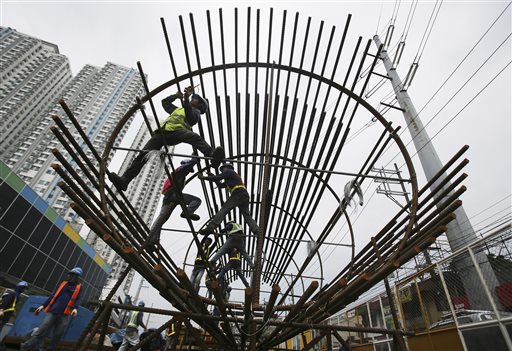
Strong investment in construction and infrastructure has led other factors that contributed to a faster-than-expected growth during the first three months of the administration of President Rodrigo Duterte. AP FILE
The Philippines became developing Asia’s fastest-growing major economy in President Rodrigo Duterte’s first three months in office, officials said Thursday, even as his fiery rhetoric hit the peso and stock prices.
The economy expanded 7.1 percent on-year in July-September, beating the consensus forecast of 6.8 percent, Economic Planning Undersecretary Rosemarie Edillon said.
READ: PH economy grew 7.1% in first three months of Duterte admin
That was faster than China’s 6.7 percent and beat other major emerging economies for the same period, Edillon said in a statement. India is due to report at the end of the month.
The news surprised experts after Duterte sparked concerns among foreign investors over his controversial war on drug crime and a decision to pick fights with the United States and the United Nations on the issue.
“All things considered, our economy’s strong growth in the third quarter is a very good sign of things to come,” Edillon added.
The country needed 6.9 percent growth in final three months of the year to hit the top end of its 6-7 percent target, she said.
“All things considered, our economy’s strong growth in the third quarter is a very good sign of things to come,” Edillon added.
Edillon said strong investment growth, particularly in construction and infrastructure, along with upbeat consumer spending drove the expansion, encouraged by low inflation and low interest rates.
Exports jumped 7.8 percent.
While the growth of salary remittances by the country’s huge overseas work force slowed, this was balanced out by a 2.9 percent growth on-year in agriculture, reversing five straight quarters of decline caused by typhoons and drought.
“It was a surprise for the financial markets,” First Grade Holdings securities analyst Astro del Castillo told AFP, referring to the growth figure.
“It affirms our view that fundamentals remain intact despite the political noise.”
“It affirms our view that fundamentals remain intact despite the political noise.”
The country’s stock market, which is at a seven-month low, rose one percent Thursday but the peso remains stuck near eight-year lows, with analysts blaming political developments as well as expectations the United States will raise interest rates.
The greenback was up 0.2 percent at 49.40 pesos in late morning trade, with analysts warning it could surge to 50 pesos by the end of the year.
In concerns echoed by other foreign business groups, international credit rating agency Standard & Poor’s warned in September that Duterte’s crime war threatened the Philippine economy and endangered its democratic institutions.
He won elections in a landslide in May after vowing an unprecedented crackdown on illegal drugs in which 100,000 people would die.
More than 4,000 people have been killed since he took office on June 30. About 1,800 were shot dead by police and about 2,600 others were murdered by unidentified attackers, according to official statistics. CBB

